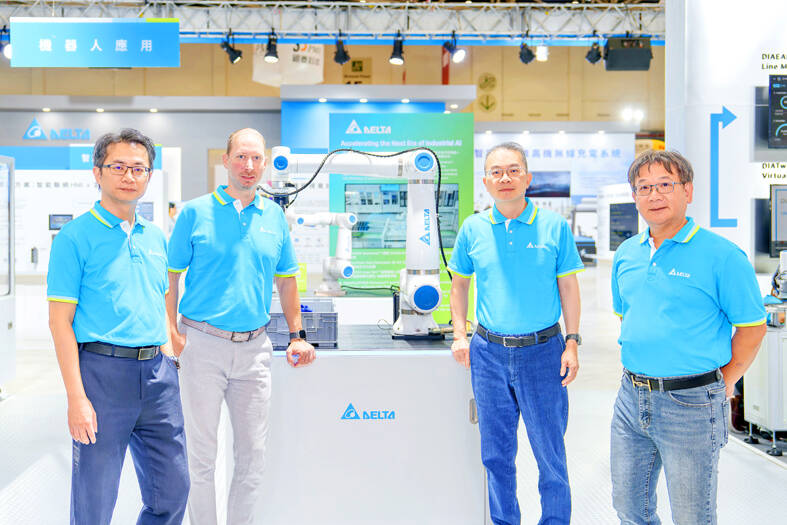Delta Electronics Inc (台達電) expects its US automation business to remain steady in the second half, with no signs of weakening client demand.
With demand from US clients remaining solid, its performance in the second half is expected to be similar to that of the first half, Andy Liu (劉佳容), general manager of the company’s industrial automation business group, said on the sidelines of the Taiwan Automation Intelligence and Robot Show in Taipei on Wednesday.
The company earlier reported that revenue from its automation business grew 7 percent year-on-year to NT$27.22 billion (US$889.98 million) in the first half, accounting for 11 percent of the company’s total revenue.

Photo courtesy of Delta Electronics Inc
Clients had placed some front-loading orders for its automation products in the first half, but the effect was not as pronounced as in consumer electronics, he said.
As most automation products are predesigned, excess inventory poses higher risks for clients, and instead of rushing urgent orders, clients have mainly requested quicker shipments, Liu said.
As Delta’s sales are mainly based on a business-to-business model, it does not expect to see dramatic seasonal changes, Liu said.
Geographically, the US is Delta’s second-largest automation market, with the company selling a full range of products, from motor drives to controllers, Liu said.
The US is the world’s second-largest manufacturing country by value, following China, Liu said.
Delta supplies US customers in the aerospace, defense and machinery segments, Liu said.
Those products carry higher unit prices and higher margins of 30 to 40 percent, he said.
Delta’s automation products shipped to its US clients are partly priced under the free-on-board method, he said, adding that the company also sells products under its own brand.
Tariff costs vary by client, depending on negotiations, with larger clients facing different terms than smaller ones, while the company bears the full costs for its own-brand products, he said.
As the US market is vast, establishing distribution channels there would require immense labor and production costs, which would not be sustainable without sufficient sales scale, he said.
As European markets are smaller and more scattered, the company can expand one market at a time, whereas in the US, development would require establishing multiple factories across several states, Liu said.
Delta operates subsidiaries and offices in Germany, Italy, France, the Netherlands and Poland, information on its Web site shows.

In Italy’s storied gold-making hubs, jewelers are reworking their designs to trim gold content as they race to blunt the effect of record prices and appeal to shoppers watching their budgets. Gold prices hit a record high on Thursday, surging near US$5,600 an ounce, more than double a year ago as geopolitical concerns and jitters over trade pushed investors toward the safe-haven asset. The rally is putting undue pressure on small artisans as they face mounting demands from customers, including international brands, to produce cheaper items, from signature pieces to wedding rings, according to interviews with four independent jewelers in Italy’s main

Japanese Prime Minister Sanae Takaichi has talked up the benefits of a weaker yen in a campaign speech, adopting a tone at odds with her finance ministry, which has refused to rule out any options to counter excessive foreign exchange volatility. Takaichi later softened her stance, saying she did not have a preference for the yen’s direction. “People say the weak yen is bad right now, but for export industries, it’s a major opportunity,” Takaichi said on Saturday at a rally for Liberal Democratic Party candidate Daishiro Yamagiwa in Kanagawa Prefecture ahead of a snap election on Sunday. “Whether it’s selling food or

CONCERNS: Tech companies investing in AI businesses that purchase their products have raised questions among investors that they are artificially propping up demand Nvidia Corp chief executive officer Jensen Huang (黃仁勳) on Saturday said that the company would be participating in OpenAI’s latest funding round, describing it as potentially “the largest investment we’ve ever made.” “We will invest a great deal of money,” Huang told reporters while visiting Taipei. “I believe in OpenAI. The work that they do is incredible. They’re one of the most consequential companies of our time.” Huang did not say exactly how much Nvidia might contribute, but described the investment as “huge.” “Let Sam announce how much he’s going to raise — it’s for him to decide,” Huang said, referring to OpenAI

The global server market is expected to grow 12.8 percent annually this year, with artificial intelligence (AI) servers projected to account for 16.5 percent, driven by continued investment in AI infrastructure by major cloud service providers (CSPs), market researcher TrendForce Corp (集邦科技) said yesterday. Global AI server shipments this year are expected to increase 28 percent year-on-year to more than 2.7 million units, driven by sustained demand from CSPs and government sovereign cloud projects, TrendForce analyst Frank Kung (龔明德) told the Taipei Times. Demand for GPU-based AI servers, including Nvidia Corp’s GB and Vera Rubin rack systems, is expected to remain high,